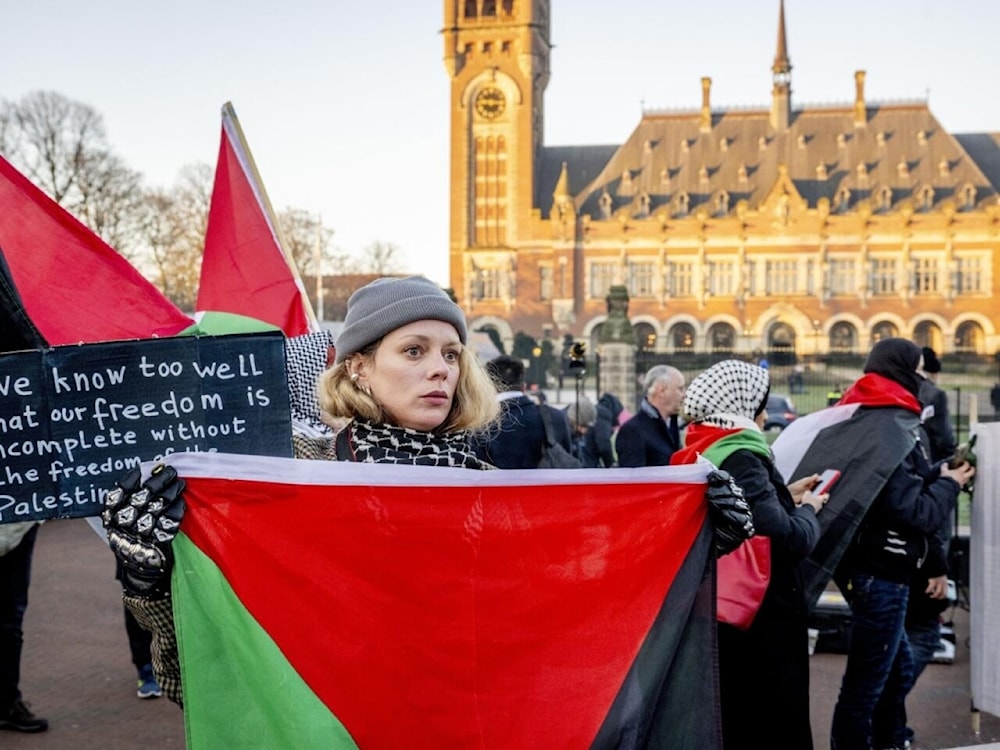8 NGOs urge UK to rethink trade links with 'Israel' amid ICJ findings
NGOs, including Amnesty International UK, Global Justice Now, and ActionAid UK, are demanding the UK utilize its leverage to bring an end to Palestinian suffering.
-

A protester holds a Palestinian flag during a demonstration outside the International Court of Justice (ICJ) in the Hague, Netherlands on January 11, 2024. (AFP)
A group of human rights NGOs, including Amnesty International UK, Global Justice Now, and ActionAid UK, asked the UK to join the EU in evaluating whether to suspend its trade deals with "Israel" due to violations of humanitarian law.
The Ministry of Health in Gaza reported today that the number of Palestinians killed by the Israeli occupation forces since October 7 has risen to 31,272, in addition to 73,024 injured.
The request made by the NGOs reflects one of the first times the issue of the future of trade relations between the UK and "Israel" has been brought up by campaigners.
The UK and the occupation this month concluded their fourth round of discussions on a new free trade agreement, which will update one inked in 1995 and remove impediments to service innovation and digital commerce.
Read more: Pro-'Israel' bias rampant in UK media: Declassified
The NGOs argue that the UK should reconsider its attitude in light of the International Court of Justice's (ICJ) preliminary conclusions that "Israel" is committing genocide. They claim that earlier genocide verdicts by the International Criminal Court have made it obvious that parties to the Genocide Convention, such as the United Kingdom, have a duty to assist in enforcing orders issued against nations, and in the case of "Israel", to prevent crimes against humanity.
They are calling for the cessation of "trade privileges, agreements and negotiations with Israel, particularly as these agreements are premised on upholding human rights and international law, and they involve trade, investment and cooperation with sectors of the Israeli economy involved in human rights and international humanitarian law violations."
“These are important points of leverage that the UK could and should utilise to try to bring an end to the ongoing serious violations of international law."
Trade Justice Movement, War on Want, Lawyers for Palestinian Human Rights, and Action for Humanity also inquired about the trade department's evaluation in light of the ICJ's interim verdict and Israeli authorities' brutality following October 7.
Director of Global Justice Now, Nick Dearden, expressed that a "normal trading relationship" could not be maintained with a side "that engages in acts of genocide," emphasizing that "the British government is complicit unless it takes all means at its disposal to end these war crimes.”
This week, UK officials reiterated their legal opinion that "Israel" is not in violation of international law.
'Israel' not complying with ICJ orders: Ramaphosa
South African President, Cyril Ramaphosa, confirmed on Monday that "Israel has not been complying with the orders issued by the [ICJ] court."
He continued to assert that South Africa sees "it fit to approach the court on an urgent basis particularly with the view of addressing the challenges in the Rafah area," as he referred to the massacres being committed in the region by "Israel".
He concluded that further action must be taken as the "people in Gaza are now starving."
"Israel" was also ordered to prevent the killing of Palestinians, causing serious bodily or mental harm, inflicting conditions of life calculated to bring about its physical destruction in whole or in part, and imposing measures intended to prevent births - all within the context of the Genocide Convention.
South Africa was not the only one that asserted this fact.
UN special rapporteur on the occupied territories, Francesca Albanese, declared last month that "Israel" is violating orders issued by the ICJ to immediately protect Palestinians’ rights and cease all activities amounting to genocide.
In late February, the Euro-Mediterranean Human Rights Monitor called for all member states of the ICJ to sever all forms of political, economic, and military relations with "Israel" due to its blatant violation of the court's decisions calling for the cessation of genocide in the Gaza Strip.
The Norwegian government is advising its enterprises against engaging in trade and economic operations that contribute to the continued existence of Israeli settlements, reinforcing its current position, Bloomberg reported last week.
Norwegian firms have requested preliminary guidance from authorities, the government said in a statement, after other nations sanctioned what they call "extremist settlers" for their human rights abuses against Palestinians.
According to the government, there is a risk that businesses are "contributing to violations of international humanitarian law or human rights" through their financial and business interactions in settlements.
Norway has been firm in its position that the settlements in the West Bank, including east al-Quds, violate international law, particularly humanitarian law and human rights.

 5 Min Read
5 Min Read








